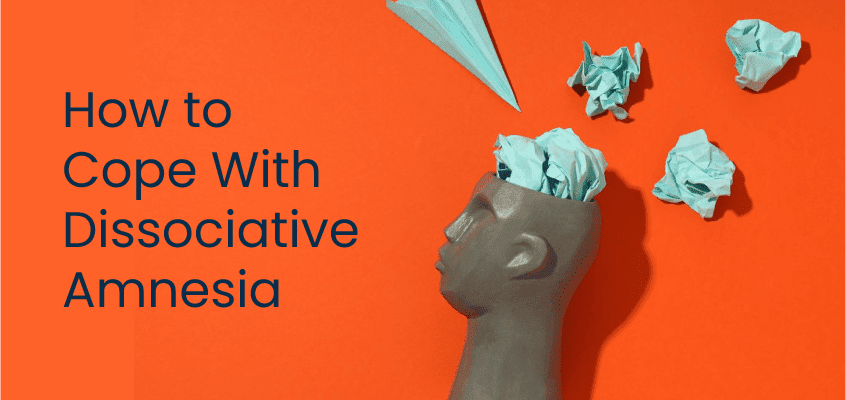Introduction
Dissociative amnesia is the term used to describe an individual’s inability to remember specific life events connected to stress or traumatic experiences. Their ability to recall crucial personal details is impaired.
What is Dissociative amnesia?
Rarely, in a condition known as dissociative fugue, an individual may forget all or most of their details, including their name, past, and other personal information. They may leave home and assume an entirely new identity in extreme circumstances.
Dissociative amnesia always results in a considerably worse memory loss problem than one would anticipate from normal forgetfulness.[1][3]
Symptoms of Dissociative amnesia
The inability to recall important autobiographical details is the fundamental symptom of dissociative amnesia. People who have this illness either forget vital information about their identity and the identities of others around them or particular events or regions in their life.
Dissociative amnesia frequently results in a person not being aware that they have lost their memories and instead just appearing confused or agitated. Other signs of the condition include:[2][4]
-
being unable to recall crucial details about oneself, such as one’s name and place of residence or employment
-
feeling cut off from one’s feelings, oneself, and others around one
-
Your memory loss is causing a disturbance in your ability to carry out regular tasks
-
forgetting particular life events
-
Adopting a new identity
Causes of Dissociative amnesia
Excessive stress, which may be brought on by traumatic experiences like war, abuse, tragedies, or calamities, has been related to dissociative amnesia. Since contently predisposes to acquire amnesia, dissociative amnesia may have a hereditary (inherited) component.
A particularly traumatic life event is a common cause of dissociative disorders like dissociative amnesia. Examples include subjection to abuse or serving active duty in the army. Those with dissociative amnesia may not remember these types of traumatising periods. A victim of abuse may find it difficult to recollect specifics or details from the period in which the abuse occurred, such as:
-
Being present when a loved one passes away suddenly
-
Experiencing a natural calamity, such as an earthquake
-
Experiencing a car accident
-
Having a near-death experience
-
Residing in a war-torn area
-
Being sexually, physically, or psychologically mistreated
Treatment of Dissociative amnesia
Treatment aims for dissociative amnesia are to relieve symptoms, ensure the patient’s safety and that of those around them, and “reconnect” the patient with their forgotten memories.[4] The therapy also helps the individual
-
handle and control painful situations safely,
-
gain new coping mechanisms and living abilities,
-
resume regular activities as soon as they can, and
-
strengthen relationships.
The individual, the type of amnesia, and the severity of the symptoms influence the optimal treatment course. In general, the following techniques can assist in conjunction during treatment:
Psychotherapy:
The most effective treatment for dissociative disorders is psychotherapy, also known as talk therapy. It is a general phrase that covers various types of treatment.
Cognitive-behavioural therapy:
This type of psychotherapy alters negative thoughts, feelings, and behaviour patterns.
Eye movement desensitisation and upcycling:
This method treats patients who experience recurring nightmares, memories, and other indicators (post-traumatic stress disorder).
Dialectic-behavioural therapy:
This type of psychotherapy assists patients with significant personality disorders (which may include dissociative symptoms). It works best soon after an episode of abuse or trauma.
Family therapy: This enlightens the family on the condition and enables them to spot any recurrence in symptoms.
Creative therapies (such as music therapy and art therapy):
In a secure and artistic setting, these therapies enable patients to examine and communicate their thoughts, emotions, and memories.
Meditation and relaxation exercises:
This assists in lessening dissociative amnesia symptoms and raising awareness of one’s mental condition.
Hypnosis:
This therapy creates a unique state of awareness through intense relaxation, indulging, and complete concentration. Patients can use it to explore memories, ideas, and feelings hiding from their conscious minds.
Medicine:
Medication cannot treat dissociative disorders. Nevertheless, treatment with antidepressants or anti-anxiety drugs may benefit patients, particularly those with despair and anxiety.
Treatment for dissociative amnesia patients typically yields positive results. However, a person’s life condition and whether they receive support from family and friends are just two of the numerous factors determining the success of the therapy.
Coping with Dissociative amnesia
A significant first step if you have dissociative amnesia is getting help.[4] There are a few coping mechanisms you can employ in the meanwhile to start moving towards recovery:
-
Treat yourself with kindness. Recognise that your body uses this technique to safeguard itself if you can’t recall something; this is acceptable.
-
Maintain a diary to keep track of occasions and people. Record the details of your daily whereabouts to go back and remind yourself of what happened.
-
Check your phone’s or calendar’s history for previous appointments. Seeing actual records of your actions may anchor you and give you confidence that they took place.
-
Acknowledge that everyone occasionally forgets things.
-
Keep working on self-care while monitoring your stress levels.
-
Share your experiences with family members to strengthen your support network. Emotional support is essential for a successful recovery.
Conclusion
Although dissociative amnesia lasts only a few days in most cases, it lasts for weeks or even months in some. You may even experience more than one episode of dissociative amnesia. However, the forecast for dissociative amnesia is favourable overall. Many people eventually regain their lost memories, often without any intervention.
Depending on the nature and extent of the amnesia and the current state of life, the outlook for dissociative amnesia can change. A quick diagnosis and course of therapy for dissociative amnesia and associated conditions can also greatly enhance the chances of a successful recovery. If you’re looking for mental health care in the comfort of your home, visit United We Care APP, an online mental health platform.










